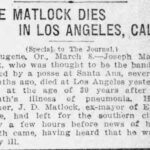[This post is based on the 52 Ancestors project by Amy Johnson Crow]
When the theme “Institutions” came up this week, I paused. My family has certainly interacted with a few—from public schools to the military, and even the occasional courthouse. But one of the most impactful institutional connections I’ve uncovered through genealogy isn’t part of my own life, yet has deeply shaped one of my ancestral lines:
The Church of Jesus Christ of Latter-day Saints.
I’m not LDS myself, but one of my ancestors—Margaret Jefferson Wells Petty—was part of that great migration we now refer to as the Mormon pioneer movement. Her story is one of conviction, resistance, resilience, and ultimately, faithful migration into the very heart of one of America’s most enduring religious institutions.
Margaret Jefferson Wells married Samuel Petty and settled in Dickson County, Tennessee. They had two daughters under the age of 3 when Samuel died, leaving Margaret “Peggy” a young widow. Family records indicate that the two daughters were Eliza and Sarah. Honestly I’ve never found any documentation of wee Eliza. She was said to have died about 1833. Margaret married her deceased husband Samuel’s cousin, R C Petty, and the Petty family eventually moved across the river to Benton County, Tennessee.
The Arresting Start
Ironically, Margaret’s path into the LDS Church began with her second husband arresting Mormon missionaries.
Her husband, Robert Cowan “R.C.” Petty, was the Sheriff of Benton County, Tennessee, when LDS missionaries (including Wilford Woodruff) passed through in 1836. He arrested them for blasphemy—then took them home instead of to jail. Why? Because they seemed like such clean, decent men.
That one night turned into a long conversation, and R.C.’s father converted immediately. Margaret? Not so much. She was a devout Methodist and deeply skeptical. But the spark had been lit.
From Reluctance to the Rocky Mountains
It took nearly a decade, but in 1844, R.C. was baptized into the LDS Church. He became an Elder and branch president in Benton County. My third great-grandmother, Sarah Petty, married John Russell in 1843, and they did not join the church. R C sold all of his property, and gave some of the proceeds to Sarah and her husband. By 1850, R C and Margaret (with his plural wife and many children) were part of the Wilford Woodruff Company—a group of over 200 individuals heading west to Utah.
Margaret had voiced an objection to leaving, but R C insisted he was leaving regardless, so she set off first to Iowa with him. Still reluctant, she eventually joined the Church too—likely sometime between Council Bluffs and Salt Lake. She endured trail hardships, loss of children, and the challenges of frontier life. Yet she followed.
And she remained a faithful part of the LDS community for the rest of her life—even after R.C. died on a mission to the Cherokee Nation in 1856.
A Legacy of Faith and Grit
Margaret was endowed in 1852. She helped settle Fort Herriman. And when the fort was abandoned in 1858, she moved to Lewiston, Utah, raising her children with strength and determination—weaving cloth for neighbors as a means to survive.
To me, this story isn’t just about one institution. It’s about:
-
How belief can change the direction of a family.
-
How institutions like the LDS Church shape history—not just through theology, but through the lives of the people who carry that faith forward.
-
And how even when an institution seems distant from your own experience, its echoes might still show up in your tree.








